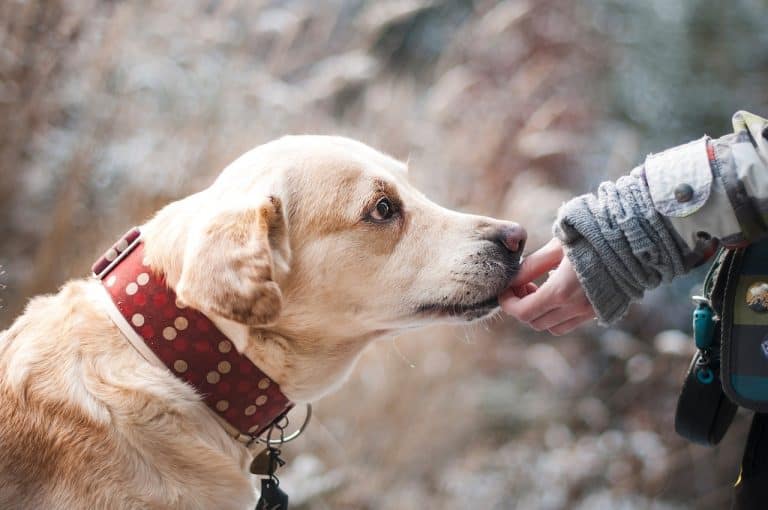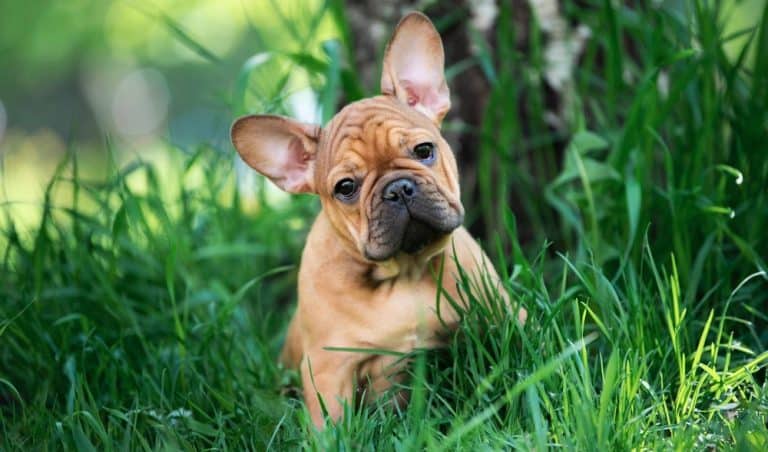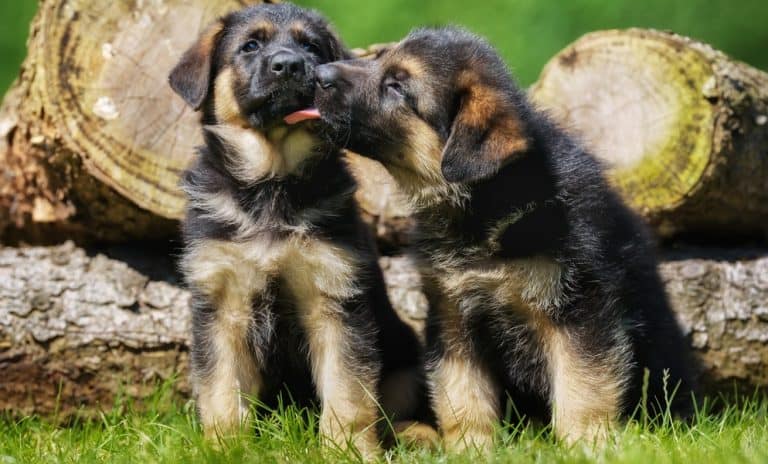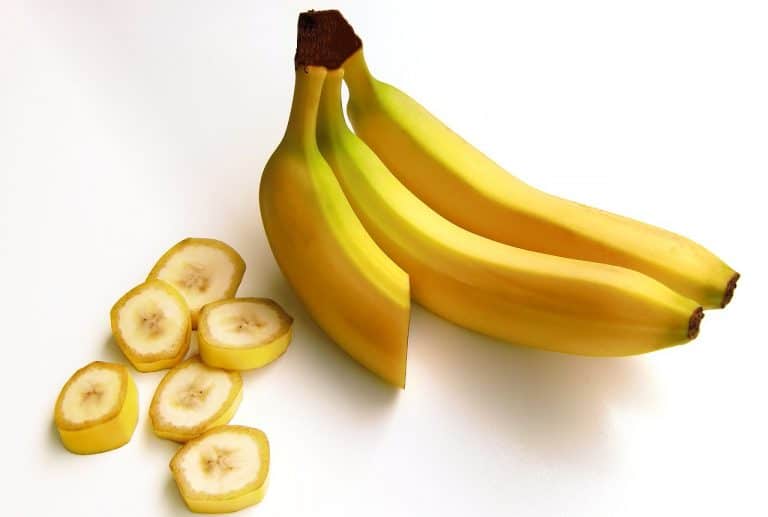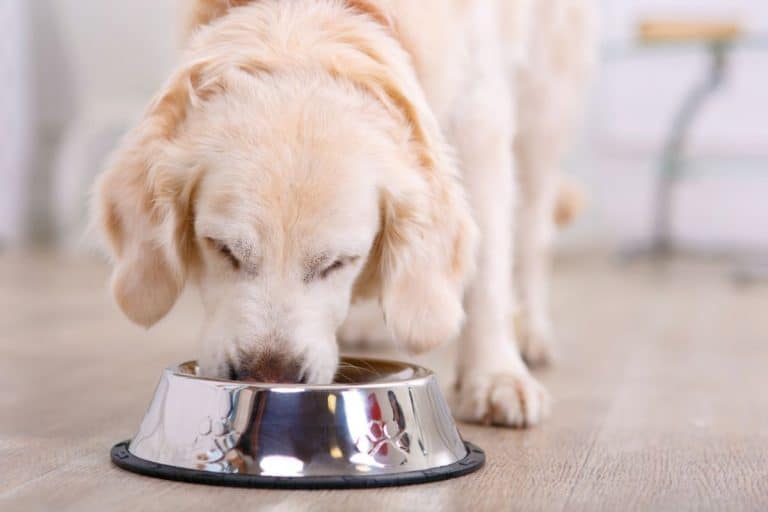How Much To Feed A Lab Puppy – Labrador Puppy Feeding Chart
According to the American Kennel Club, Labrador Retrievers are the most popular breed of dogs to own. It makes sense, given their sweet disposition, playfulness, and their great love of fetch.
But, like any family member, you need to care for them properly and you need to know how much to feed a lab puppy whether he or she is a 4 week old, 8 weeks old, 10 weeks old or 12-week old lab puppy.
Nutrition during puppyhood is one of the biggest influencers of your dog’s lifespan and development. Although pet nutrition is important throughout their lifespans, puppyhood is the most important of all.
Feed too much, and your adult Labrador will be prone to joint problems, feed too little, and puppies fail to realize their genetic potential.
If you have recently adopted or are considering adopting a lab puppy, you will need to make sure that you are taking careful care of your new addition.
This includes knowing how much to feed a lab puppy. Nutrition is so crucial to developing dogs as it increases their longevity and quality of life.
How Much Should A Lab Puppy Eat?
Like any new baby, your puppy is growing quickly and will need to maintain a steady flow of nutrition to grow up well. Once your puppy has weaned off of mom’s milk, it’s time for dog food.
Puppies typically need at least three meals a day but depending on where they are in the Labrador growth chart cycle, they might need more or less.
Your puppy is likely to eat all of the food available, which could lead to excessive weight gain, which can cause bone issues down the road.
For this reason, it is best to follow a lab puppy feeding chart to know you are on the right track. It’s important that you feed them only the best dog food for Labradors.
Lab Puppy Feeding Chart
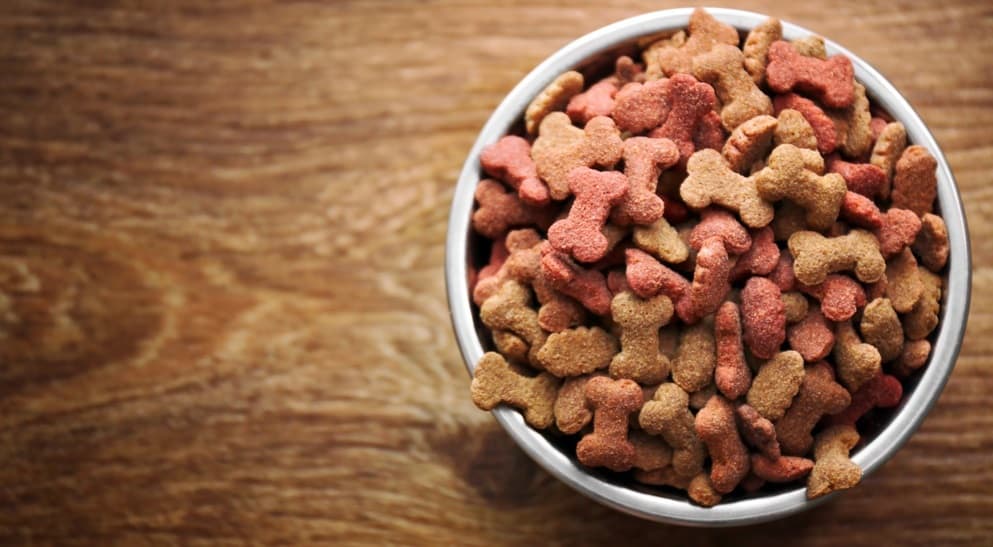
Here Are The Feeding Suggestions For A Lab Puppy
• 0 to 30 days: Puppy relies on mom’s milk, but if he’s not gaining weight, you can supplement with puppy milk formula.
• 4 to 6 weeks: Slowly introduce softened puppy food. Puppy should not be weaned yet.
• 8 to 12 weeks: Puppy should be fully weaned and offered puppy food 3 to 4 times a day. Puppy should be eating 2 to 3 cups of food a day.
• 12 weeks to 6 months: Puppy needs to be eating puppy food 2 to 3 times a day, with meals divided into equal amounts.
• 6 to 15 months: Continue with puppy food, giving puppy 2 equal meals a day.
Our Recommended Dog Foods For Lab Pups
This post contains affiliate links, and I will be compensated if you make a purchase after clicking on my links.
- Royal Canin Labrador Retriever Puppy (Editor’s Choice)
- Hill’s Science Diet Dry Dog Food (Runner-Up)
- Purina Pro Plan Dry Dog Food (Budget-Friendly)
- Purina ONE Smart Blend
- Blue Buffalo Life Protection Formula
How Much To Feed A Lab Puppy?
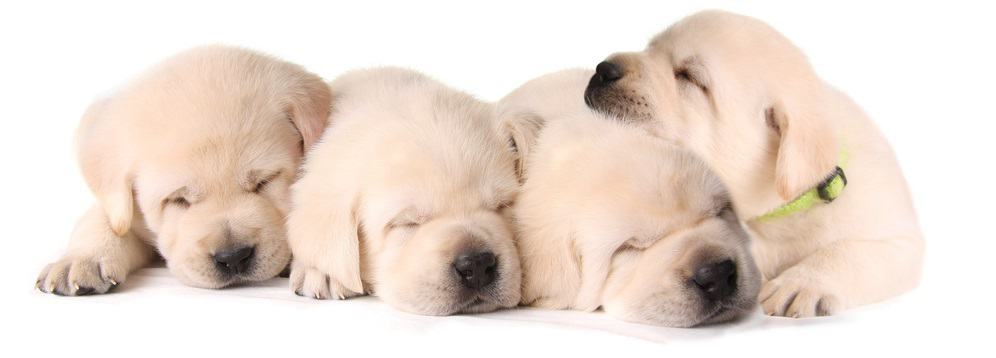
2 Week Old Lab Puppy
At 2 weeks old, your Labrador puppy should be with his mother still, drinking her milk. Puppies normally open their eyes around two weeks, but are still entirely reliant upon their mothers. If you have a litter of labs yourself, watch for growth changes among the puppies.
More assertive puppies could be taking more than their share of milk, leaving others hungry and smaller.
If you do have a pup or two seeming underweight, the first thing you can do is to make sure the smaller dogs get milk before the bigger ones. Otherwise, you can make up the difference with a puppy formula.
3 Week Old Lab Puppy
At 3 weeks old, your lab puppy’s legs will figure out how to move in sync. While he is still dependent on his mother for his milk, he will be able to stand up and sit down now, which will require a little more milk as he burns off more calories.
Your puppy will also be getting in his milk teeth at this point. While some breeders might offer a taste of puppy food at this stage, it is better to wait to introduce food. The exception is if his mother is not doing well producing milk or he has a large appetite.
4 Week Old Lab Puppy
Your 4 week old lab puppy will still be with his mother and drinking his mother’s milk, but this is the time to introduce puppy food.
You want to add puppy food in gradually to not upset your puppy’s stomach. To do this, you make a mixture of a ¼ puppy food and ¾ water.
Only give the puppy a little to start to make sure that he is ready to take it. You can offer this mixture to your puppy several times a day, but never try to force a puppy to eat.
Weaning is a very gradual process and must be done with patience.
5 Week Old Lab Puppy
When your lab puppy reaches 5 weeks of age, your puppy should have had his first taste of puppy food and should be more willing to take it than he might have been a week ago.
You should notice that the pup’s mother is spending less and less time with the puppies as the puppies will be less reliant on their mother’s milk.
Though, the puppies will still nurse when they can. You will notice that the mother no longer lays down to feed the puppies, but instead stands up to feed them and leaves as soon as possible.
6 Week Old Lab Puppy
Your 6-week old lab puppy should be more interested in the puppy mixture that you have been making.
Once the puppy begins to eat all of the puppy food that is offered and not having any ill consequences, you can gradually decrease the amount of water in the mixture until it’s ¾ food and ¼ water.
The puppy will be active by this time and more willing to move around away from his mother. This is the perfect time to start to wean since he is not so reliant upon her presence.
7 Week Old Lab Puppy
At 7 weeks, your lab puppy should be nearly weaned, if not completely weaned yet. Puppies at this age will only be nursing as allowed by their mother as they will no longer need it for sustenance.
They should be doing well on your watered-down food mixture and working their way toward being able to just eat straight puppy food.
With 7 week old lab puppies, it is important to feed them dry food that is full of healthy protein as wet food might cause them to gain weight too rapidly. You don’t want a skinny puppy but beware of high-fat foods, with labs especially.
8 Week Old Lab Puppy
Your 8 week old lab puppy should be weaned and ready to be re-homed. Puppies still need to have food offered to them three to four times a day. The quantity of food that your puppy need will vary from pup to pup, but generally, 8 week old lab puppy will need 2 cups of puppy food every day.
Never leave the food out for puppies to come eat as they wish, because then it will be harder to know how much they have eaten at what time.
You don’t want to risk overfeeding them. Your veterinarian should be able to guide you to know what your puppy’s ideal weight is.
9 Week Old Lab Puppy
A lab puppy who is 9 weeks old will have been at his new home for about a week normally. It is likely that his food will have been changed or is being changed from what the breeder was feeding the dog to what you as an owner would like to feed your dog.
Any food changes should happen gradually to not disrupt their digestive systems.
Your puppy will be more curious this week, which means it is important to stick to a lab puppy feeding chart and quantity of food to keep your puppy on track.
You can also feed your puppy cooked meats, but keep them in the dish and never from the table.
10 Week Old Lab Puppy
A 10 week old lab puppy should really be showing his appetite now. Your pup might need 2 to 3 cups of puppy food a day, depending on the size of your puppy and his hunger.
Only put the food out for 10 to 15 minutes at meal times and then remove what was not eaten.
This will help the puppy learn to eat what is offered and get his stomach on a good feeding schedule. Watch to make sure your puppy is not getting too much food as this can put undue pressure on his growing bones.
11 Week Old Lab Puppy
Your lab puppy will have an incredible appetite at 11 weeks. This is the biggest growth period for your puppy, so you can expect him to eat more food and seem constantly hungry.
Increase the quantity of food slightly if he seems unsatisfied, but stick with your feeding schedule so he isn’t asking for food outside of the window.
Your puppy should be eating 3 to 4 meals a day, with equal portions for each meal. Your puppy likely will need around 3 cups of food throughout the day. As your puppy should be longer now, he should have a defined, slim waist.
12 Week Old Lab Puppy
By 12 weeks, you should be able to reduce your puppy’s food back down to 2 cups of food a day. It is still ideal to offer your 12 week old lab puppy 3 meals a day, which can be tricky if you are at work all day, but this is also a prime developmental period.
Sticking to 3 meals a day will help with the digestive developmental process and ensure that your growing baby is getting the right nutrition.
His weight should be regulated now, especially since Labradors in generally like to eat as much as is available without restraint.
13 Week Old Lab Puppy
A 13 week old lab puppy is going to be busy. While he might seem like he is hungry, keep in mind that as a breed, labs typically indicate that they are hungry when they are not. You want to keep your lab on a healthy lean diet, preventing any unnecessary weight gain.
Also remember that your lab is going to be more curious than ever, which might mean that he eats items that are not food.
This can be incredibly dangerous for your furbaby, so keep your floors clean and pay attention to what he is picking up outside.
14 Week Old Lab Puppy
Your 14 week old lab puppy should be potty trained by this point. He might need reminders still to go out, but he should have good control over his bladder.
This is the point where he will be losing his milk teeth and be getting his adult teeth.
The teething stage is where your pup will be biting the most, so keep him biting the right things by giving him chew toys as well as hard dog food. The dry food will help relieve the biting sensation that is going to be his highest priority.
How Many Calories Does A Lab Puppy Need?
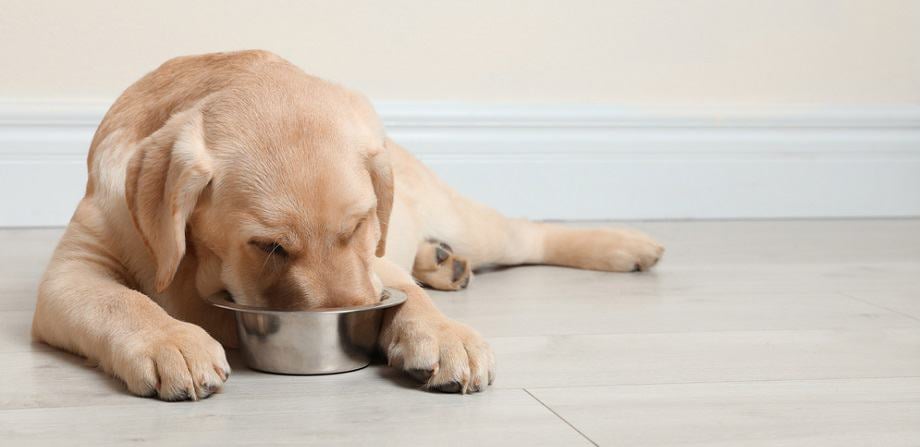
The smaller and younger your Labrador is, the more often they need to eat. They need to eat three to four times per day.
If puppies go longer without eating, their blood sugar level can drop which leads to a dangerous condition known as hypoglycemia. The number of calories your puppy needs changes as they grow heavier and older.
The daily calorie requirement of your puppy is calculated basing on their current body weight. Therefore, it is essential to weigh your puppy regularly to adjust their food portions accordingly.
To know how much food your puppy needs, find their RER (Resting Energy Requirement) and multiply it by 2. The formula of RER is 70(weight in kgs)3/4
For instance, if your Labrador weighs 10kg their RER = 70(10)3/4 which is 400. Therefore, their daily intake should be 800 calories.
What Human Foods Can A Labrador Puppy Eat?
Labradors can eat certain human foods that provide them with all the necessary nutrients they need to grow strong and healthy. These foods include:
- Meat – puppies eat can eat meat because they are carnivores by nature, and it is a great source of healthy protein.
- Small fish – this includes mackerel, sardine, and anchovies which are a great source of omega3 fatty acids.
- Organ meat such as liver, lungs, heart, kidneys, pancreas, and spleen are a great addition to your puppy’s diet.
- Other foods include eggs, green vegetables, berries, fermented foods, and bone broth.
What Human Foods Are Dangerous For A Labrador Puppy?
Some human foods are dangerous, some are poisonous, and some can affect the health of your Labrador. The following are foods that you should not feed your puppy:
- Chocolate – contains theobromine which is a toxic compound for dogs.
- High sugar foods such as candy and ice cream can cause heart disease, obesity, joint pain, dementia, and diabetes.
- Raw wild boar and raw salmon contain parasites that can be fatal.
- Macadamia nuts can cause vomiting, hyperthermia, and tremors in your puppy.
- Grapes, wine, and raisins can lead to kidney failure.
- Others include alcohol, coffee, tea, and foods with xylitol such as sodas, toothpaste, and candies.
How Much Do Lab Puppies Grow Each Week?
Your puppy should weigh 2 pounds for every week that he is in age. So, for example, if your puppy is 12 weeks old, he should weigh around 24 pounds. When lab puppies have reached between 18 and 20 weeks, they will be half of their adult weight.
Since his weight will vary depending on growth spurts, watch the waist of your puppy to make sure that he is not too thin, but not too chunky either. You should be able to feel ribs under his skin, but not visibly see them.
5 Best Dog Foods For Lab Puppies
- Royal Canin Labrador Retriever Puppy (Editor’s Choice)
- Hill’s Science Diet Dry Dog Food (Runner-Up)
- Purina Pro Plan Dry Dog Food (Budget-Friendly)
- Purina ONE Smart Blend
- Blue Buffalo Life Protection Formula
1. Royal Canin Labrador Retriever Puppy
Best Dog Food For Lab Puppies Overall (Editor’s Choice)
Our recommendation for the best all-around puppy food for Labradors is the Royal Canin puppy food. This food is specifically designed for the Labrador Retriever breed, taking into account common future issues that they face as well as what the appropriate nutrition for a lab is.
It also has nutrition for healthy skin and coat development. This food is recommended to be served to puppies as young as 8 weeks up to 15 months.
Pros:
• Breed specific
• Supports healthy joints
• Promotes skin and coat health
• Good for pups up to 15 months
• Helps maintain ideal weight
Cons:
• We didn’t find any!
2. Hills Science Diet Large Breed Puppy
Runner-Up
Our runner-up for the best puppy food for labs is the Hills Science Diet food that is made for large breeds. The food’s formula is made specifically for the needs of a large breed puppy.
This food comes with both glucosamine and chondroitin, which is important when it comes to joint development for large breeds.
Pros:
• Formulated for large breed puppies
• Made with high quality ingredients
• Exciting flavour to please your puppy
• High in vitamins, which is good for growth
• High levels of calcium for bone development
Cons:
• Contains a high amount of grain
3. Purina Pro Plan Large Breed Puppy
Budget Friendly
Considering how much puppies eat, you might need a budget friendly food. For this, we suggest the Purina Pro formula.
This food is made specifically for large breed puppies and is formulated with high amounts of high-quality protein, including salmon, chicken, and lamb.
The food is also legume-free, which is important in preventing bloat and digestive issues. It is made with weight management in mind, helping your pup get off to the right start.
Pros:
• Natural sources of glucosamine
• DHA from fish oil for brain growth
• Made for large breed puppies
• High-quality protein
• Weight management
Cons:
• Not formulated for skin care
4. Purina ONE SmartBlend Large Breed Puppy Formula
Another great food choice for Labrador puppies is the Purina One SmartBlend puppy formula for large breeds. This means that it includes natural sources of glucosamine, which is essential for joint development for Labrador Retriever puppies.
It also contains good levels of protein, which is important for brain, heart, and muscle development, putting your puppy off to the right start. It is also intended to be easy to eat and digest.
Pros:
• Formulated for large breeds
• Great for brain development
• Easily digestible
• Natural sources of glucosamine
• High protein for heart development
Cons:
• Contains rice and corn
5. Blue Buffalo Life Protection Formula Puppy
The last puppy food for labs that we will be looking at is the Blue Buffalo Life Protection. While this is not specific for large breeds, it does have a lot of great nutrition for all developing puppies, including DHA and ARA.
DHA and ARA are both found in mother’s milk and are essential for brain development. This food has no fillers either, making it a healthy choice.
Pros:
• Contains DHA and ARA for brain health
• Formulated with antioxidants, vitamins, and minerals
• No chicken by-products
• No fillers, corn, wheat, or preservatives
• Contains nutrition for joint health
Cons:
• Not breed or size specific
2 Month Old Lab Puppy Weight
At 2 months, your Labrador Retriever puppy should weigh anywhere from 9 to 15 pounds. Any less than that and your puppy is going to need to eat more frequently in order to close the gap.
Puppies that weigh more than that should also be watched for food to make sure they are not gaining weight excessively. The placement on the range of your puppy will depend on his natural size, sex, and how much he ate from his mother.
3 Month Old Lab Puppy Weight
By 3 months, your pup should weigh between 13 and 23 pounds. You will notice that the space between the two ranges increases and will continue to vary based on your dog’s individual size.
As long as your puppy is staying on his growth curve, your puppy should be growing well. Make sure that your puppy is consistently gaining and not plumping out or thinning. You should never be able to see your puppy’s ribs and his sides should not bulge.
4 Month Old Lab Puppy Weight
When your puppy is 4 months old, you should know whether your puppy is going to be a larger or smaller lab. The ideal weight range here is anywhere from 18 pounds up to 30 pounds.
Watch carefully to be sure that your puppy is growing steadily still and that his weight has not stagnated. A full-grown Labrador Retriever, on average, weighs around 75 pounds. So at 4 months, your pup should not be quite half the weight he will be as an adult.
5 Month Old Lab Puppy Weight
When your lab puppy has reached 5 months old, you can expect your puppy to weigh anywhere from 25 pounds up to 40 pounds, depending on the size and sex of your dog.
Your puppy should still be sticking to his growth curve, so follow your vet’s recommendation as to whether your pup weighs a healthy amount or not. Make sure that you can see your puppy’s waist easily.
He should be lanky and little bit awkward in his body, without any sign of puppy fat remaining. If he seems plump, you might consider cutting back his food slightly to help get him down to the right weight.
6 Month Old Lab Puppy Weight
At 6 months old, your lab puppy should be between 30 and 50 pounds. While your puppy still has a ways to go as far as growing goes, he should be getting longer and taller, continuing to slim out as he gets bigger.
Remember to watch for excess weight gain as that could be harmful to your puppy overall.
He should still have a good amount of energy and be getting a lot of exercise to maintain his health and his weight. Keep consistent with his food to ensure that he is growing as well as he should be.
Switching From Lab Puppy Food To Adult Food
You will be able to determine whether your puppy is ready to be switched to adult food by his height. If he has stopped growing upward, it is likely time to stop puppy food and transition to adult food. For labs, this happens at about 12 months of age.
To switch foods, you will need to gradually mix in the new food with the old food over the course of several days to avoid stomach upset.
What If My Lab Puppy Won’t Eat?
Puppies need to eat more often than adult dogs do. They are growing rapidly, burn a lot of calories, and need the fuel. If your puppy has stopped eating suddenly, and you have not changed food, you need to call your vet once it has gone past a day.
Their appetites will increase and decrease through growth cycles, but should never stop completely. If your lab puppy is refusing food altogether, you need to take him in to be seen by the vet.
What Nutrients Does A Lab Puppy Need?
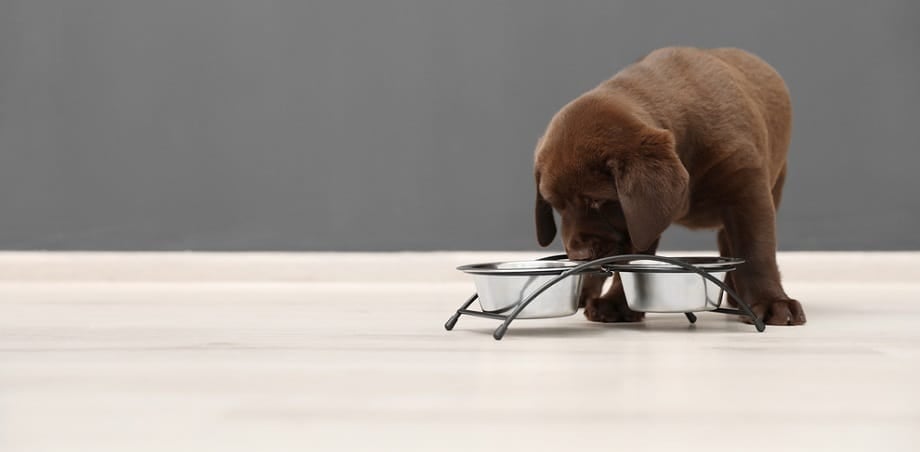
Your lab puppy needs a quality, balanced diet that is rich in both vitamins and minerals. For labs, your food should have fatty acids to help maintain your puppy’s coast and to reduce shedding.
Diets that are rich in antioxidants and protein are ideal and will provide long-term benefits.
The less grain in the food, the better. Labs have a tendency to overeat and eat just about anything they can get ahold of, so keep a careful eye on the quality of food you are feeding him.
You should make sure that the first ingredient listed is a kind of protein.
Should You Feed A Lab Puppy Supplements?
The reason that you feed your lab puppy food rather than adult dog food is because of the ingredients. Puppy food is higher in nutrients and calories than adult food, because it is intended for growing dogs.
As a result, you do not need to feed your puppy supplements. In fact, since puppy food is usually enriched, you could be giving your puppy too many vitamins and minerals.
Too much calcium will cause more harm than good. If you want to add glucosamine into your lab’s diet to avoid joint issues, talk to your vet about when that would be appropriate.
How Much Water Should A Lab Puppy Drink?
Once a puppy has been weaned off of his mother’s milk, he will need a constant supply of water to compensate for the lacking hydration. Younger puppies drink about half of a cup of water every two hours.
Older puppies drink about an ounce of water per pound of body weight. When you are housetraining your puppy, you will want to remove the water dish at night.
Be consistent for when it is removed and make sure it is 2 to 3 hours before bedtime to ensure he can go out once more before settling into bed.
How Much Exercise Does A Lab Puppy Need A Day?
The amount of exercise that your lab puppy needs will depend on his age. For example, a 3 month-old puppy needs about 15 minutes total exercise a day. You can work it out by calculating 5 minutes of exercise for every month of his age.
A 6 month-old puppy would need about 30 minutes total exercise a day. Since puppies burn a lot of energy normally, you do not need to exercise them much at all.
It is not recommended that you take puppies under 3 months out for walks, because it exhausts them and is unnecessary.
Raw & Cooked Food vs. Commercial Dry Dog Food
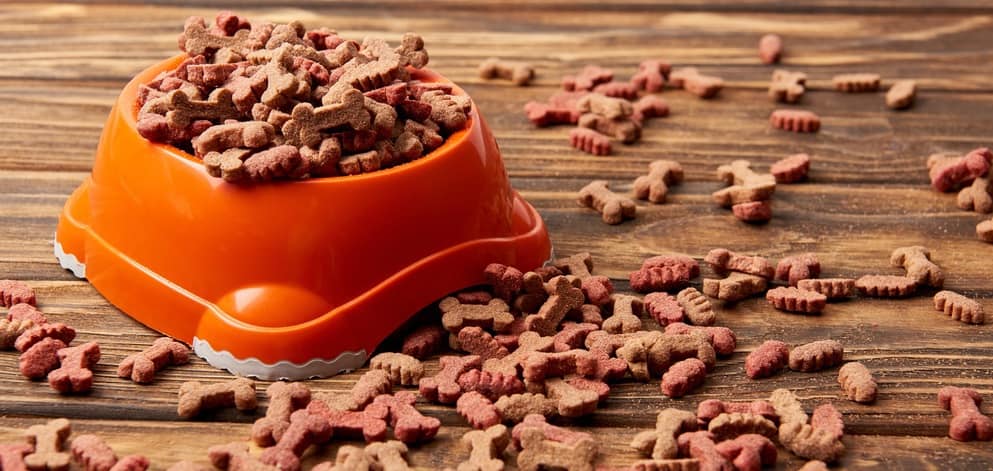
So we can assume that you know how much to feed a lab puppy at this point. You have many options when it comes to feeding your Labrador pup, and you’ll find advocates and opponents of the various feeding methods around every corner. Not even vets agree! Let’s do a quick roundup:
Raw Or Cooked Food Prepared At Home
Because nutrition is so crucial for puppies, you don’t have time to play around. If you want to go the natural or home-cooked route, make sure you know what you are doing. There are entire books written on the subject of raw feeding and homemade pet foods. Get one and become an expert.
In my personal opinion (and that of many vets), getting used to raw food is quite a process for pups.
I’m also not comfortable with staking my puppy’s future on my very limited skills as a pet nutritionist. After all, if I make mistakes, my puppy is going to be the victim!
Commercial Dog Food
Here, we are looking at wet and dry foods. You can get away with just dry food, or you can add some wet foods into the equation as a treat.
What I like best about commercial puppy foods is that you get them with clear guidelines as to how much and how often to feed. Since you should take your puppy for a vet check-up as soon as possible, you have a great opportunity to ask for feeding advice.
One caveat about commercial foods that I’d like to mention is that the cheaper they are, the less likely they are to be particularly good.
You don’t have to go for the most expensive option, but I would suggest going with a brand your vet recommends or choosing a mid-priced option.
Apart from being very expensive, wet foods don’t clean your pup’s teeth. Crunching kibble helps a bit here. I’d recommend wet foods as a treat, and I’d suggest that you choose a wet food that’s made by the same company that produces the kibble.
The reason for that is that you should reduce the kibble ration to make up for the extra wet food you’re giving your pup.
How Many Times A Day Should You Feed Your Pup? (Lab Puppy Feeding Schedule)
Although you can get away with feeding an adult dog once a day (twice is better), your puppy needs to be fed more frequently. A good puppy food will have feeding instructions that cover this, but in short:
- Four times daily until your pup is three months old.
- Three times a day from three to six months old.
- Twice a day from six months onward.
Not Too Fat, Not Too Thin
Unfortunately, I can’t give you guidelines on how much your puppy should weigh at what age. Even the most highly pedigreed Labradors won’t all be the same. Some will be larger, others smaller, and the growth rate will vary too. However, a broad guideline is possible.
Young pups invariably have roly-poly figures, but from the age of three months, you ought to see a waist on your dog. You should NEVER be able to see ribs showing through.
If you do, it’s time to go to the vet for an expert opinion. The same is true if you suspect your puppy of being overweight. Don’t risk underfeeding. Get the vet’s opinion before you change your puppy’s diet.
“Free” Feeding
Because most people have to work during the day, they often leave the day’s food ration out so that the puppy can help himself.
There’s just one problem: a puppy might decide to eat everything up in the morning. Later in the day, he might be hungry, but there won’t be any food.
Dogs, especially Labs, sometimes eat out of sheer boredom and believe me, your Labrador pup is very bored when you aren’t around.
If possible, ask a friend or family member to feed your puppy at midday if you can’t do so yourself.
Eat, Love, Play
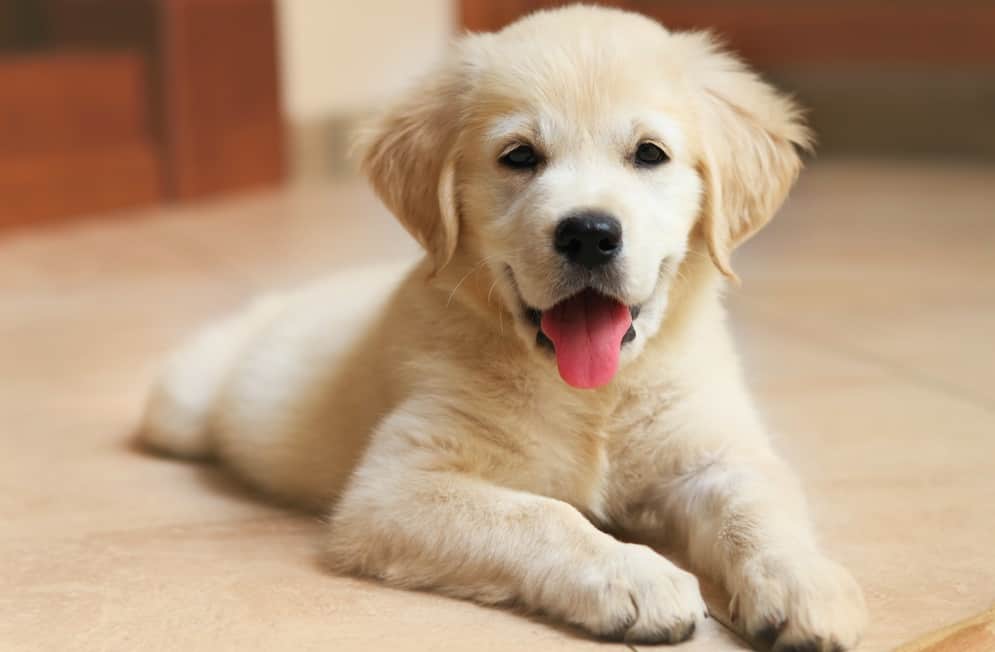
Remember that love and play are almost as important to your puppy’s health as a good diet. Training also becomes a game for your young Lab, so don’t just look for the best puppy food for Labs, also give your pup plenty of your time.
Frequently Asked Questions
How Many Small Meals Should I Feed My New Puppy?
Between 12 weeks and 6 months of age, three or four feedings each day should be on offer to your puppy. However, you should not use any more than 3 cups of dog food in total.
How Often Should You Feed Your Labrador?
The amount of food you feed your lab each day is determined by its size, level of activity, and metabolism.
The feeding recommendations on the majority of store-bought dog foods are dependent on your puppy’s weight, and our chart above provides advice on many of the common foods for Labrador puppies.
What Are The Benefits Of Feeding Your Puppy A High Quality Diet?
Because premium food contains far better quality ingredients, it has a higher nutritional density, which means you may feed your dog less and get the same nutritional results.
What Are The Best Foods For Labradors With Allergies?
If a Labrador suffers from allergies, they may need to be offered hypoallergenic foods or limited-ingredient foods (and keep him away from table scraps!).
We recommend speaking with your veterinarian about finding a specialty diet that is tailored to your dog’s needs, as they are the most knowledgeable.
What Are The Signs Of A Food Allergy?
Your dog may have a common food allergy or allergies if they have hot patches on their skin, tender spots from frequent licking, or recurrent ear infections (which could be caused by yeast accumulation).
Allergies frequently present themselves on the skin, so look for itching and scratching. Consult your veterinarian about allergy tests, so you can figure out what’s causing your dog’s reaction.
How Much Do Labradors Weigh When Fully Grown?
A healthy male adult Labrador will weigh around 29 to 36 kg, whereas a female will weigh a little less – 25 to 32 kg.
How Do I Weigh My Puppy?
Simply weigh yourself before and after holding the dog, then deduct the difference.
How Much Exercise Should A Labrador Get A Day?
Labrador retrievers are high-energy, active breeds that require daily exercise. – think walks, playing in the yard, and fetching a ball. You can even train them to come on runs or bike rides for extra exercise.
How Long Should I Feed My Lab Puppy Food?
While smaller breeds can be fed as adults at only 9 to12 months, larger breeds like Labradors are still pups until they are 12 to 18 months old, therefore puppy food can be fed until then.



